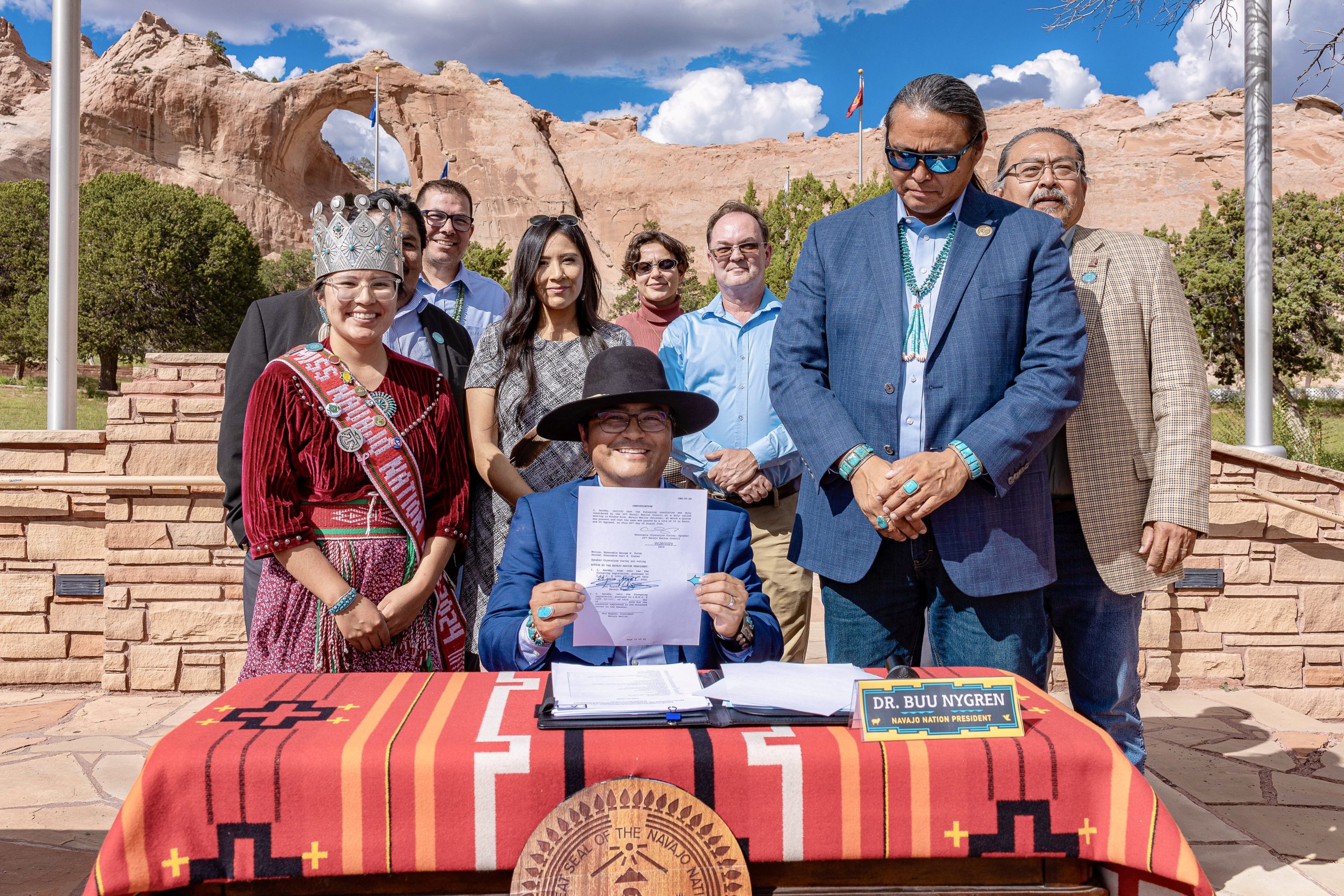Podcast: Play in new window | Download | Embed
Photo: A moonlit arch over Grand Staircase-Escalante National Monument, Utah. (Bob Wick / BLM)
Two representatives from the Mountain West are seeking to strip president powers to designate national monuments and historic landmarks. But Indigenous communities say the effort will remove a safeguard for sacred lands and pave the way for development.
The Mountain West News Bureau’s Yvette Fernandez has more.
US. Reps. Mark Amodei (R-NV) and Celeste Maloy (R-UT) say the “Ending Presidential Overreach on Public Lands Act” is about fairness.
The legislation, Amodei says, would overturn a “one-sided approach on major land management decisions.”
It would strike a section from the Antiquities Act of 1906.
Mathilda Guerrero-Miller with Native Voters Alliance of Nevada sees the bill as an attempt to turn lands over to private interests.
“What this bill is trying to do is prevent more uses and protections of sacred spaces — all to protect and to better corporate greed for housing and development.”
During his first administration, President Donald Trump scaled back the acreage on the Grand Staircase-Escalante and Bears Ears National Monument in Utah.
President Joe Biden restored them.
President Biden also designated one of the newest national monuments, Avi Kwa Me in Nevada.

(Courtesy Navajo Nation Office of the President and Vice-President)
Navajo Nation officials recently agreed to allow shipments of uranium ore to again cross the reservation.
As KNAU’s Ryan Heinsius reports, it comes after tribal leaders threatened to turn back trucks hauling ore from a mine near the Grand Canyon last summer.
The company Energy Fuels says it’ll limit uranium ore transport to specific routes and hours of the day and won’t haul when public events or cultural celebrations are held.
The company says it’ll also prevent dust from escaping the trucks and allow the Navajo Nation to inspect the loads.
Steve Etsitty is the executive director of the Navajo Nation Environmental Protection Agency.
“We have put in place heightened safety measures for the communities where this transport will take place. And we have definitely received a lot more recognition of our role to do these protective measures by the company.”

This photo was part of a social media campaign opposed to uranium ore shipments across the Navajo Nation before the new rules were agreed. (Courtesy Navajo Nation)
As part of the deal, Energy Fuels will also help remove 10,000 tons of uranium waste from abandoned mines left on the Navajo Nation by other companies decades ago as the federal government built its nuclear arsenal.
The Indigenous-led group Haul No!, however, condemned the agreement and said cleanup of existing nuclear waste shouldn’t be linked to creating more.
The group vowed to continue its work to close the Pinyon Plain Mine and the White Mesa Mill in southern Utah.
Last summer, Energy Fuels began hauling ore from the mine near the South Rim of the Grand Canyon.
Navajo Nation President Buu Nygren tried to block the trucks and said the tribe wasn’t given any notice by the company.
In the months since, Navajo officials and Energy Fuels have been in negotiations brokered by Arizona Governor Katie Hobbs.
The company expects the uranium ore shipments to resume this month.
 Royal Canadian Mounted Police (RCMP) are investigating four deaths on a reserve in Saskatchewan.
Royal Canadian Mounted Police (RCMP) are investigating four deaths on a reserve in Saskatchewan.
As Dan Karpenchuk reports, police say the victims may have been targeted.
The Carry the Kettle Nakoda Nation is about 50 miles east of Regina.
Police have confirmed that the deaths of two men and two women are being considered as homicides.
RCMP inspector Ashley St. Germaine reassured people that there was no risk to the public at this time.
She says officers are working to identify suspects in what is a complex case, and there is no information to confirm that the suspects are still at large.
‘The Saskatchewan RCMP has a family liaison team working with the families of those believed to be the victims to provide them with investigational updates and connect them with the necessary support services. We know that when these unimaginable tragedies happen, it can be easy to speculate and spread rumors particularly in this age of social media.”
St. Germain asks that anyone with information should contact police.
The chief of a nearby First Nation offered her condolences and said this horrific even affected everyone deeply. And she says in the coming days her community walks alongside the people of Carry the Kettle Nakoda Nation as they carry the burden of these losses.
Get National Native News delivered to your inbox daily. Sign up for our daily newsletter today.



